Decade Advisory Board
The Decade Advisory Board is an advisory body to UNESCO’s Intergovernmental Oceanographic Commission (IOC), the UN body tasked with coordinating the Ocean Decade, that will provide strategic advice on Decade implementation. Members are selected for a period of two years and serve in their individual capacities.
The Decade Advisory Board will provide recommendations on the endorsement of programmes and Decade Collaborative Centres and comment on the consolidated performance of Ocean Decade Actions. Board members will also contribute to the assessment of resource requirements for Ocean Decade Actions and raise awareness about the Ocean Decade, including with potential resource providers.
The 15 experts selected by the IOC/UNESCO for the period 2022-2023, hailing from 13 countries, come from government, private sector, philanthropy, civil society and the scientific community.
Meet the members of the Decade Advisory Board:
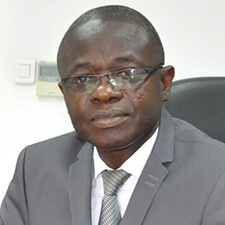
Professor Kouadio Affian has been Vice-President of the University Felix Houphouet-Boigny (Côte d’Ivoire) in charge of training and research since 2012. Before that, he was Director of the Remote Sensing Center for Applied Research as well as Director of postgraduate African school of Remote Sensing (1999-2010) at the University of Cocody, before becoming Dean of the school of Earth Sciences (2010-2012). Prof. Affian has served on numerous national bodies and committees; at international level, he has regularly taken part in UNESCO and IOC/UNESCO bodies since 2005 – most recently, he was named Chair of IOCAFRICA in 2021. He has more than 80 publications to his credit, focusing among others on the development of integrated coastal zone management, coastal erosion, sea surface temperature, sea color, bathymetry and environment studies based on remote sensing and GIS. Prof. Affian has degrees in marine biology and remote sensing applied to oceanography.
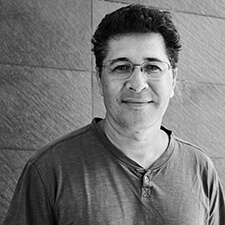
Dr. Tamatoa Bambridge is a research director at the National Center for Scientific Research (CNRS) working in a laboratory of marine biology in Moorea (French Polynesia) since 2007. He also teaches at the Ecole Pratiques des Hautes Etudes (EPHE), at the University of French Polynesia and the University of New Caledonia at research master level. His current primary research focuses on the intersection between biodiversity, culture, and languages and the factors influencing resilience and hybrid governance. He also uses tools such as modelisation and actor participation for elucidating spatially explicit strategies on lagoon and reefs. Tamatoa’s long-term commitment to the understanding of Polynesian traditional management of resources lead to the publication of “The Rāhui” in 2016. He is the president of the scientific committee of the UNESCO Man and Biospere reserve of Fakarava in the Tuamotu Archipelago.
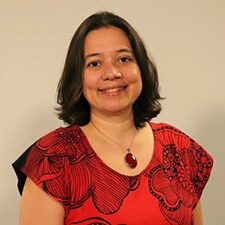
Dr.rer.nat. Silvia Chacón Barrantes is a tenured professor at the Physics Department of the National University, Costa Rica. She is the coordinator and founder of the SINAMOT Program (acting as National Tsunami Warning Center for Costa Rica) and has been the country’s Tsunami National Contact since 2015. She has been involved since 2014 in the IOC/UNESCO Tsunami Program as Chair of the Regional Working Group for Central America of the ICG/PTWS (2017-2021) and Chair of the ICG/CARIBE-EWS (2018-2022). She leads a project developing tsunami evacuation maps in Costa Rica and internationally and led the Tsunami Ready recognition of four communities in Costa Rica. She was recognized as one of the 100 most powerful women in Central America by Forbes for 2019, 2020 and 2021. She holds a PhD in coastal geosciences from Kiel University (Germany), a master’s degree in physical oceanography from CICESE (Mexico) and a bachelor’s in physics from the University of Costa Rica.
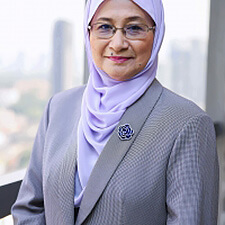
Professor Dato’ Dr. Noraieni Haji Mokhtar has served in the public and academic sector since 1980, contributing significantly to Malaysia’s higher education and national capacity building. She has been working as an academic at the University Malaysia Terengganu for over 30 years, teaching and carrying research in physics, hydraulics, physical modelling, data management, coastal, environmental engineering and policy studies. She served as the Director and Undersecretary at the National Oceanography Directorate, Ministry of Science Technology and Innovation in 2008-2014 and was responsible for the set-up of Malaysia’s National Oceanographic Data Center. Nor Aieni was also involved in the IOC/UNESCO Sub-Commission for the Western Pacific (WESTPAC) and invented a patented system for coastal protection: Sine Slab. Nor Aieni holds a bachelor’s degree from Binghamton University (USA), a master’s degree from University College of Swansea (UK), and a PhD from University Malaysia Terengganu.
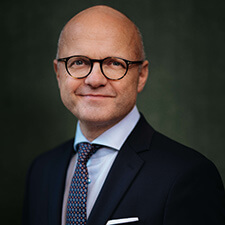
Vidar Helgesen is Executive Director of the Nobel Foundation in Stockholm, Sweden. An international lawyer by training, he has held several public positions in the Norwegian government, most recently as Special Representative for the Ocean. He led the Group of Sherpas for the High Level Panel for a Sustainable Ocean Economy 2018-2020. He has been Minister of Climate and Environment, Minister of European Affairs and Chief of Staff to the Prime Minister, as well as Deputy Minister of Foreign Affairs. He has served as Co-chair of the China Council for International Cooperation on Environment and Development, Secretary-General of the International Institute for Democracy and Electoral Assistance and Special Advisor to the President of the International Federation of Red Cross and Red Crescent Societies. He is a Board member of CICERO Center for International Climate Research, Norfund and C4IR Ocean.
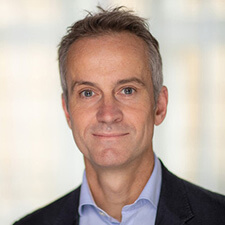
Professor Gideon Henderson is Chief Scientific Adviser at the Department of Environment, Food and Rural Affairs (Defra, UK), responsible for overseeing the quality of evidence that the Department relies on for policy decisions. He also provides ministers with scientific advice and sets the priorities for scientific research and evidence-gathering. He has been Professor of Earth Sciences at the Department of Earth Sciences in the University of Oxford since 2006. He is also a Senior Research Fellow at University College, Oxford and an Adjunct Associate Research Scientist at the Lamont Doherty Earth Observatory of Columbia University. His awards include the 30th Annual Plymouth Marine Science Medal 2016, European Union of Geosciences outstanding young scientist award in 2001, and the Leverhulme Prize Fellowship in 2001. In 2013, he was elected a Fellow of the Royal Society.
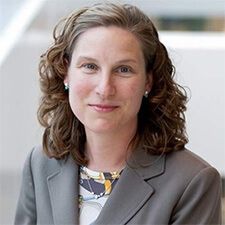
Charlotte Hudson is the Project Director of the Lenfest Ocean Program, a scientific grant-making program based at The Pew Charitable Trusts (Washington, D.C., USA), that funds research projects that address the needs of marine and coastal stakeholders and supports grantees to engage with the people most likely to use the results. She is responsible for identifying thematic areas of research and overseeing the design and implementation of research projects that include purposeful engagement with those who might use the research. She also oversees the engagement with and communication of research results in ways that inform policy decisions and promote the sustainable management of the ocean. Hudson has co-authored many papers on the role of science, philanthropy and policy in decision-making. She received a bachelor’s degree in biology from Davidson College and a master’s degree in environmental management from the Nicholas School of the Environment at Duke University.
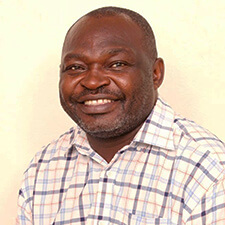
Dr. James Gitundu Kairo is a Pew Fellow (2019) and Chief Scientist at the Kenya Marine and Fisheries Research Institute, where he heads a dedicated team working on mangroves and associated blue carbon ecosystem. Kairo is a member of the International Scientific Working Group on Blue Carbon (Blue Carbon Initiative) and served as the coordinating lead author of the IPCC’s Special Report on the Ocean and Cryosphere in a Changing Climate (SROCC).
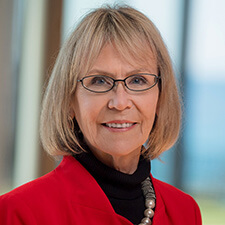
Dr. Margaret Leinen is the Director of Scripps Institution of Oceanography and Vice Chancellor for Marine Science of University of California at San Diego (USA). She is an ocean biogeochemist and paleoceanographer whose research includes study of ocean carbon cycling and the role of the ocean in climate. She served as Assistant Director for Geosciences, US National Science Foundation from 2000-2007. While there, Leinen was co-chair of the inaugural Subcommittee on Ocean Science and Technology, and was chair and vice-chair of the US Global Change Research Program. During 2017 and 2018, she was a US Department of State Science Envoy for the Oceans to Latin America and the Pacific. Internationally, she has served on many scientific advisory boards and committees. She served as the President of the American Geophysical Union, President of the Oceanography Society and chair of the AAAS Section on Atmospheric and Hydrospheric Sciences.
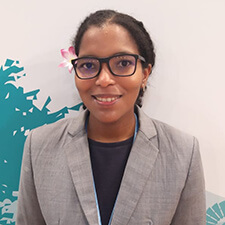
Angelique Pouponneau is a lawyer (Seychelles and UK). She holds an LLM in Environmental Law; specializing in the law of the sea and natural resources law. Angelique is also a trained climate change negotiator under the AOSIS Climate Change Fellowship Programme at the United Nations. She has worked in different countries in the Caribbean, Pacific and the Indian Ocean on a wide range of projects relating to sustainable fisheries, sustainable management of marine biodiversity within and beyond national jurisdiction, and climate change, in particular climate adaptation and climate finance. Further, she served as a legal expert of the African Group of Sixth Committee in works of oceans and law of the sea at the United Nations. Moreover, Angelique has experience working with civil society as a co-founder and board member for not-for-profit organizations in Seychelles and abroad.
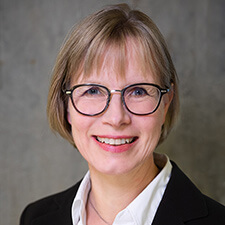
Dr. Bente Pretlove is the Programme Director for Ocean Space in DNV (Norway). In this role, she manages DNV’s research efforts related to the sustainable development of ocean-based industries. Bente has more than 20 years’ experience in climate change, sustainability and environmental management in combination with technology and innovation. She focuses on systemic thinking and cross-disciplinary collaboration and frequently works at the interface between research and industry. She has held leading roles and engaged closely with different industry sectors: NGOs, UN organisations and governments. She serves as an expert and industry representative in a number of different organisations and committees. Amongst others, she is an appointed Member of the Norwegian National Committee for the Ocean Decade and Vice Chair for Blue Growth in the EU Waterborne Technology Platform. Bente is also the DNV representative in the UN Global Compact (UNGC) Ocean Stewardship Coalition.
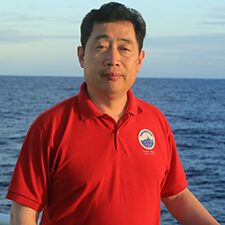
Dr. Fangli Qiao, Academician at the International Eurasian Academy of Sciences and editor-in-chief of Ocean Modelling, is the Chair Professor of Physical Oceanography and the Deputy Director General of the First Institute of Oceanography (FIO), Ministry of Natural Resources of China. His research interests cover ocean and climate model development, ocean dynamics, turbulence and air-sea interaction. He established the non-breaking surface wave-induced mixing (Bv) theory and discovered the Bv generation mechanism through wave-turbulence interaction. He developed the first-ever new generation of fully coupled surface wave-tide-circulation ocean model (FIO-COM) as well as the coupled atmosphere-ocean-wave typhoon/hurricane model (FIO-AOW). Dr. Qiao was member of the Ocean Decade’s Executive Planning Group and then Decade Advisory Board; he is also co-chair of IOC/WESTPAC. He has received numerous academic awards and has over 380 publications in peer-review scientific journals.
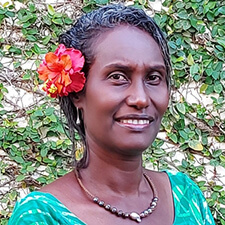
Dr. Katy Soapi is the Coordinator for the Pacific Community Centre for Ocean Science at the Pacific Community (SPC, New Caledonia). Before that, she was the Manager of the Pacific Natural Products Research Centre at the University of the South Pacific (USP) in Fiji. She has worked with Pacific Island governments to assist with the development of guidelines and policy on access and benefit sharing. Katy is an adviser on marine genetic resources supporting Pacific Island countries on marine biodiversity in areas beyond national jurisdiction (BBNJ) process at the UN. Katy is passionate about developing the capacity of early career ocean professionals and is also active at the community level. Katy holds a bachelor’s degree from USP, a master’s from the University of Sydney, Australia, and a PhD from the University of East Anglia, UK. She grew up on the island of Rendova, Solomon Islands.
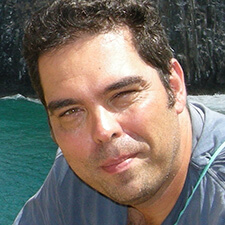
Dr. Alexander Turra is a professor at the Oceanographic Institute of the University of São Paulo (IOUSP, Brazil) and coordinator of the UNESCO Chair on Ocean Sustainability, based at the Oceanographic Institute and the Institute of Advanced Studies at the University of São Paulo. He is a biologist that exercises interdisciplinary and integrated research, focusing on themes such as marine biodiversity, governance, integrated management, marine conservation, environmental impact assessment, climate change and marine pollution (marine litter). Turra seeks to promote the integration between science and society, policy makers and the private sector to support public policies and technological development and innovation applied to the ocean.